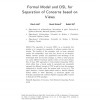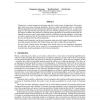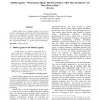1728 search results - page 65 / 346 » Self-Organisation: Paradigms and Applications |
JOT
2010
13 years 7 months ago
2010
The separation of concerns (SOC), as a conceptual tool, enables us to manage the complexity of software systems that we develop. The benefits of this paradigm, such as reuse, enhan...
COLT
2010
Springer
13 years 6 months ago
2010
Springer
Clustering is a central unsupervised learning task with a wide variety of applications. Not surprisingly, there exist many clustering algorithms. However, unlike classification ta...
ICDE
2003
IEEE
14 years 10 months ago
2003
IEEE
For applications that involve rapidly changing textual data and also require traditional DBMS capabilities, current systems are unsatisfactory. In this paper, we describe a hybrid...
MDM
2004
Springer
14 years 2 months ago
2004
Springer
Mobile Agents have brought around a new way to perform computations and develop distributed application and it is now struggling for a visible position in the area of distributed ...
ENTCS
2010
13 years 8 months ago
2010
Components provide an easy to use programming paradigm allowing for better re-usability of application code. In the context of distributed programming, autonomous hierarchical com...



